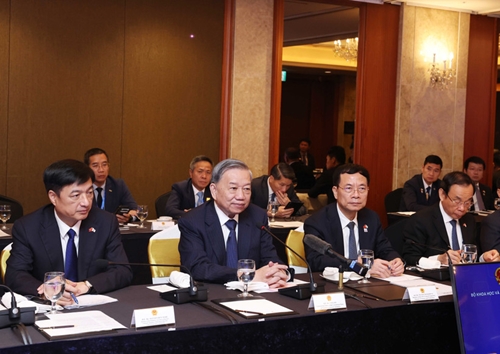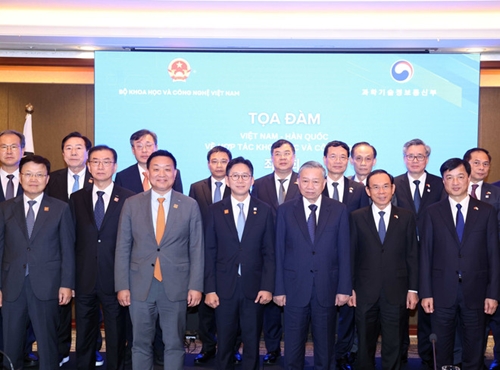The event was co-hosted by Vietnam's Ministry and Science and Technology and Ministry of Foreign Affairs, the Vietnamese Embassy and the RoK's Ministry of Science and Information and Communication Technologies, marking the first of its kind to establish a strategic cooperation framework centered on three key growth drivers -science and technology, innovation, and digital transformation.
    |
 |
|
Party General Secretary To Lam (second from left) at the dialogue |
In his speech, General Secretary To Lam cited the RoK’s “Miracle on the Han River” as proof of the transformative power of technology-driven growth, urging both nations to make it a strategic pillar of their comprehensive strategic partnership.
He said Vietnam has adopted a national strategy prioritizing sci-tech, innovation and digital transformation as key drivers to boost competitiveness and become a high-income and developed nation. The country is focusing on policy reform, talent training, financial investment and international cooperation to advance these fields.
Vietnam is building a quality workforce, especially in emerging sectors like AI, and encouraging overseas Vietnamese scientists to contribute to national development. Partnerships with nations like the RoK, he said, are vital to accessing cutting-edge technologies, learning from global best practices and finding “shortcuts” to catch up with global progress.
The Party chief underscored Vietnam’s commitment to substantial research and development funding, fostering links among academia, research institutes, businesses and State to bring innovations into production and trade.
Shifting cooperation from manufacturing outsourcing toward technology transfer, research and development (R&D) is essential, he said, urging both countries to leverage their respective strengths for mutual benefit.
He reaffirmed that sci-tech cooperation will be a key pillar to elevate bilateral relations, expressing confidence the Vietnam - RoK comprehensive strategic partnership would deliver inclusive and sustainable gains for both nations.
Meanwhile, Vietnamese Minister of Science and Technology Nguyen Manh Hung revealed that a Central Steering Committee for sci-tech development, innovation and digital transformation, chaired by Party General Secretary Lam, has been established to guide these efforts.
Vietnam is eager to acquire the RoK’s experience in technology-driven growth, particularly in hi-tech, emerging and core technologies, he said.
According to him, the Vietnamese Government has increased annual state spending on these sectors from 1% to 3% of the budget, with further rises planned. Vietnam is also revising its laws on high technology and technology transfer, offering robust incentives for foreign investors who bring expertise to Vietnam. He called on Korean enterprises to spread know-how by setting up training and R&D hubs in Vietnam.
With a target of sustaining growth above 10% annually over the next decade, Vietnam has overhauled laws, policies, governance structures and economic mechanisms to foster development, promote startups and attract investment, he said.
    |
 |
|
The Vietnamese delegation at the event |
Hailing Vietnam as an increasingly attractive destination for Korean investors, Hung also called for deeper collaboration in semiconductors, electronics, telecommunications, artificial intelligence, quantum technology, new energy, biotechnology, nanotechnology and cybersecurity. He proposed joint R&D programs, technology transfer between companies, research institutes and universities, and the creation of advanced engineering training centers. He also highlighted the need to learn from Korean startup ecosystem and develop support policies for small and medium-sized enterprises to modernize their technology.
Vietnam looks to work with the RoK to build a digital government platform, develop a national data center, strengthen cybersecurity, national digital sovereignty and governance capacity, he added.
Korean delegates shared insights on digital transformation, innovation in small and medium-sized enterprises (SMEs), and national strategy development. Representatives from Korean research institutes, universities, and technology firms proposed partnerships with Vietnamese counterparts in rare earth recovery, production technologies, joint R&D, and technology support for SMEs.
Source: VNA